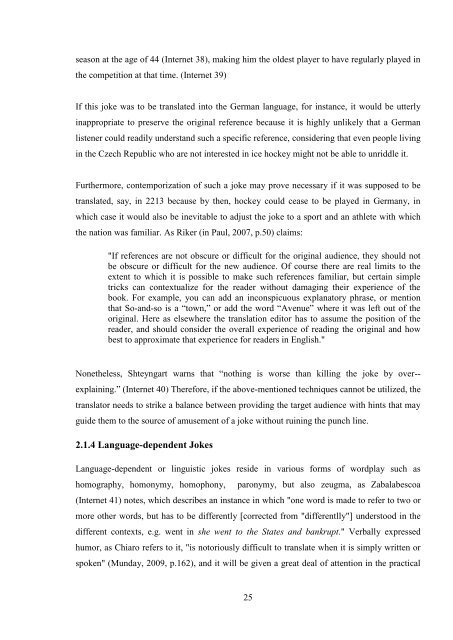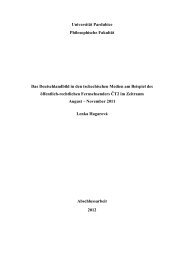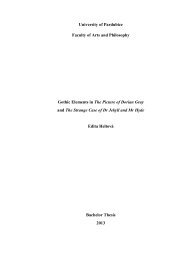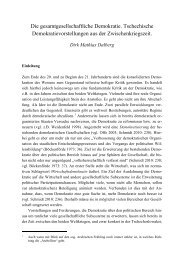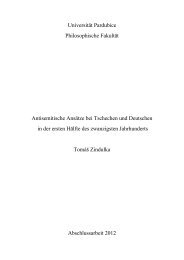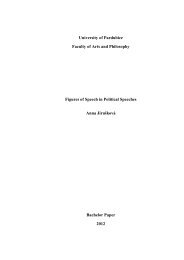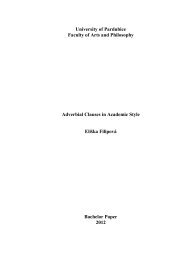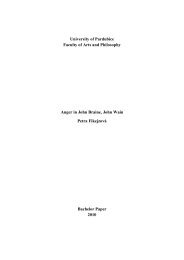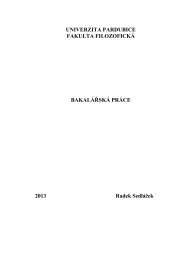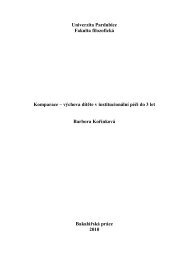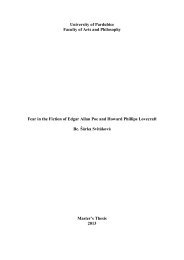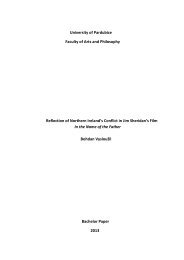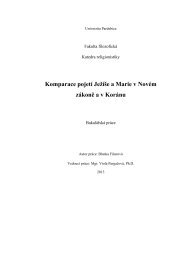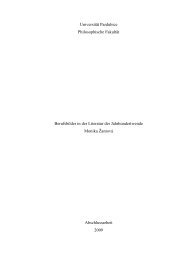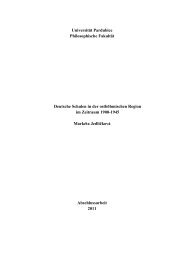UNIVERZITA PARDUBICE FAKULTA FILOZOFICKÁ BAKALÁŘSKÁ ...
UNIVERZITA PARDUBICE FAKULTA FILOZOFICKÁ BAKALÁŘSKÁ ...
UNIVERZITA PARDUBICE FAKULTA FILOZOFICKÁ BAKALÁŘSKÁ ...
You also want an ePaper? Increase the reach of your titles
YUMPU automatically turns print PDFs into web optimized ePapers that Google loves.
season at the age of 44 (Internet 38), making him the oldest player to have regularly played in<br />
the competition at that time. (Internet 39)<br />
If this joke was to be translated into the German language, for instance, it would be utterly<br />
inappropriate to preserve the original reference because it is highly unlikely that a German<br />
listener could readily understand such a specific reference, considering that even people living<br />
in the Czech Republic who are not interested in ice hockey might not be able to unriddle it.<br />
Furthermore, contemporization of such a joke may prove necessary if it was supposed to be<br />
translated, say, in 2213 because by then, hockey could cease to be played in Germany, in<br />
which case it would also be inevitable to adjust the joke to a sport and an athlete with which<br />
the nation was familiar. As Riker (in Paul, 2007, p.50) claims:<br />
"If references are not obscure or difficult for the original audience, they should not<br />
be obscure or difficult for the new audience. Of course there are real limits to the<br />
extent to which it is possible to make such references familiar, but certain simple<br />
tricks can contextualize for the reader without damaging their experience of the<br />
book. For example, you can add an inconspicuous explanatory phrase, or mention<br />
that So-and-so is a ―town,‖ or add the word ―Avenue‖ where it was left out of the<br />
original. Here as elsewhere the translation editor has to assume the position of the<br />
reader, and should consider the overall experience of reading the original and how<br />
best to approximate that experience for readers in English."<br />
Nonetheless, Shteyngart warns that ―nothing is worse than killing the joke by over--<br />
explaining.‖ (Internet 40) Therefore, if the above-mentioned techniques cannot be utilized, the<br />
translator needs to strike a balance between providing the target audience with hints that may<br />
guide them to the source of amusement of a joke without ruining the punch line.<br />
2.1.4 Language-dependent Jokes<br />
Language-dependent or linguistic jokes reside in various forms of wordplay such as<br />
homography, homonymy, homophony, paronymy, but also zeugma, as Zabalabescoa<br />
(Internet 41) notes, which describes an instance in which "one word is made to refer to two or<br />
more other words, but has to be differently [corrected from "differentlly"] understood in the<br />
different contexts, e.g. went in she went to the States and bankrupt." Verbally expressed<br />
humor, as Chiaro refers to it, "is notoriously difficult to translate when it is simply written or<br />
spoken" (Munday, 2009, p.162), and it will be given a great deal of attention in the practical<br />
25


